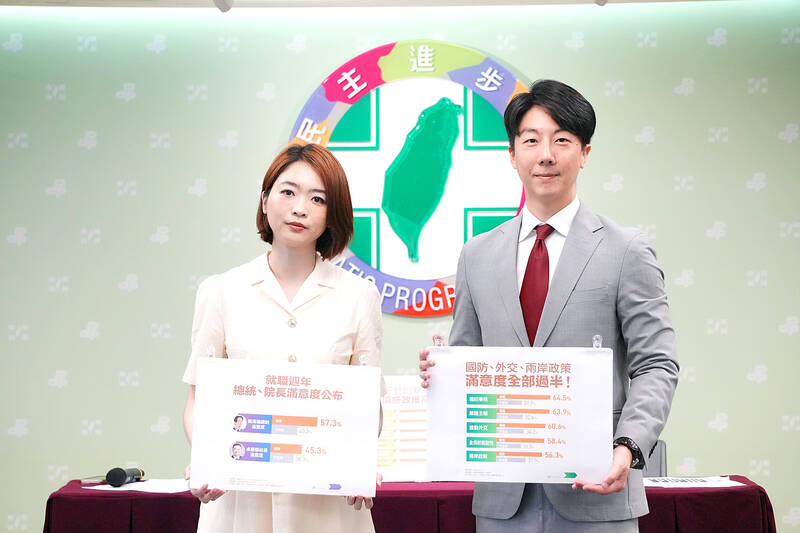Most of the public have a favorable view of President William Lai (賴清德), with satisfaction rates particularly high for his handling of national defense, safeguarding of Taiwan’s sovereignty, and dealing with foreign affairs, including his China policies, a Democratic Progressive Party (DPP) poll showed yesterday ahead of the one-year anniversary of his inauguration.
Lai’s approval rating was 57.3 percent, up from 46.7 percent last month, despite global economic turmoil over US tariff policies, with the approval ratings for all of his major policies garnering more than 50 percent, DPP spokeswoman Han Ying (韓瑩) said.
His disapproval rating was 40.2 percent, Han said, citing data from the poll.

Photo: CNA
Lai’s administration has led Taiwan forward over the past year, despite ever-changing global issues, Chinese intimidation and opposition parties holding a majority in the legislature, Han added.
Lai received particularly high ratings for his policies to bolster national defense, with 64.5 percent approving against 31.1 percent disapproving; 63.9 percent approval for safeguarding Taiwan’s sovereignty versus 32.6 percent disapproving; and 58.4 percent approving of the establishment of the Whole-of-Society Defense Resilience Committee and 31.3 percent disapproving, she said.
Endorsement of Lai’s policies was especially high among young people, with 74.4 percent and 73.9 percent of the 20-to-29 age group backing the national defense and civilian defense committee policies respectively, Han said.
His approval was 60.6 percent for foreign affairs initiatives, while 34.2 percent disapproved.
On cross-strait policies, his approval rating was 56.3 percent versus 37.7 percent disapproving, she said.
Female respondents on average backed Lai’s policies by 5 to 10 percentage points more than their male counterparts for his policies on national defense, sovereignty, foreign affairs and cross-strait dealings, she said.
The survey was conducted on Monday and Tuesday, garnering 1,055 valid responses from people aged 20 or older nationwide.
Interviews were conducted via landline or mobile phone. The poll had a 3 percent margin of error and a confidence level of 95 percent.
Separately, the Chinese Nationalist Party (KMT) told a news conference in Taipei that a rally would be held on Monday to urge Lai to step down.
A motorcade destined for DPP headquarters would depart from KMT headquarters in the afternoon, it said, calling on drivers joining the rally to honk twice at 5:20pm to express their anger toward the Lai government.
KMT Secretary-General Justin Huang (黃健庭) said the past year has been the darkest time in Taiwan’s history and the nation’s democracy has been severely compromised.
The Lai government has focused on power struggles, ignoring the economy and people’s livelihoods, while creating social confrontations by abusing the judiciary and promoting a mass recall campaign, Huang said.
The government “knelt down” before any negotiations began when the US announced its tariffs, allowing US President Donald Trump to take as much as he liked, he said.
“You can never wake someone who is pretending to be asleep,” KMT spokeswoman Yang Chih-yu said, explaining the decision to call for people to sound their horns in protest.
Additional reporting by Shih Hsiao-kuang

US climber Alex Honnold is to attempt to scale Taipei 101 without a rope and harness in a live Netflix special on Jan. 24, the streaming platform announced on Wednesday. Accounting for the time difference, the two-hour broadcast of Honnold’s climb, called Skyscraper Live, is to air on Jan. 23 in the US, Netflix said in a statement. Honnold, 40, was the first person ever to free solo climb the 900m El Capitan rock formation in Yosemite National Park — a feat that was recorded and later made into the 2018 documentary film Free Solo. Netflix previewed Skyscraper Live in October, after videos

NUMBERS IMBALANCE: More than 4 million Taiwanese have visited China this year, while only about half a million Chinese have visited here Beijing has yet to respond to Taiwan’s requests for negotiation over matters related to the recovery of cross-strait tourism, the Tourism Administration said yesterday. Taiwan’s tourism authority issued the statement after Chinese-language daily the China Times reported yesterday that the government’s policy of banning group tours to China does not stop Taiwanese from visiting the country. As of October, more than 4.2 million had traveled to China this year, exceeding last year. Beijing estimated the number of Taiwanese tourists in China could reach 4.5 million this year. By contrast, only 500,000 Chinese tourists are expected in Taiwan, the report said. The report

Temperatures are forecast to drop steadily as a continental cold air mass moves across Taiwan, with some areas also likely to see heavy rainfall, the Central Weather Administration (CWA) said. From today through early tomorrow, a cold air mass would keep temperatures low across central and northern Taiwan, and the eastern half of Taiwan proper, with isolated brief showers forecast along Keelung’s north coast, Taipei and New Taipei City’s mountainous areas and eastern Taiwan, it said. Lows of 11°C to 15°C are forecast in central and northern Taiwan, Yilan County, and the outlying Kinmen and Lienchiang (Matsu) counties, and 14°C to 17°C

STEERING FAILURE: The first boat of its class is experiencing teething issues as it readies for acceptance by the navy, according to a recent story about rudder failure The Hai Kun (海鯤), the nation’s first locally built submarine, allegedly suffered a total failure of stern hydraulic systems during the second round of sea acceptance trials on June 26, and sailors were forced to manually operate the X-rudder to turn the submarine and return to port, news Web site Mirror Daily reported yesterday. The report said that tugboats following the Hai Kun assisted the submarine in avoiding collisions with other ships due to the X-rudder malfunctioning. At the time of the report, the submarine had completed its trials and was scheduled to begin diving and surfacing tests in shallow areas. The X-rudder,